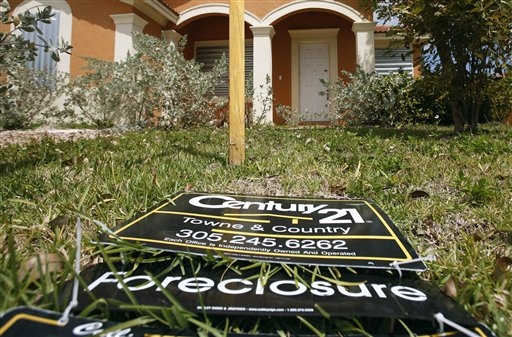Residential real estate prices dropped in January by the most in more than a year, raising the risk that U.S. home sales will keep slowing.
The S&P/Case-Shiller index of property values in 20 cities fell 3.1 percent from January 2010, the biggest year-over-year decrease since December 2009, the group said today in New York. Somewhat surprisingly, Chicago, Phoenix and Minneapolis were three of the cities with the largest drops.
Rising foreclosures are swelling the number of houses on the market, which may put additional pressure on prices in coming months. At the same time, a further decline in home values may keep potential buyers on the sidelines as they foresee better deals, hurting construction and consumer spending as owners' equity evaporates.
“Prices will continue to move downward probably for the rest of the year,” said David Semmens, a U.S. economist at Standard Chartered Bank in New York, who correctly forecast the drop. “They won't turn around until you have consumers feel that housing is genuinely cheap and until they feel a lot more secure in their labor-market position.”
Another report showed consumer confidence dropped in March ad Americans grew more concerned about the economic outlook. The New York-based Conference Board's sentiment index fell to 63.4 this month from 72 in February, the research group said.
Home prices fell 0.2 percent in January from the prior month after adjusting for seasonal variations, following a 0.4 percent December decrease. Unadjusted prices dropped 1 percent from the prior month as 19 of 20 cities showed declines.
The year-over-year gauge provides better indications of trends in prices, the group has said. The panel includes Karl Case and Robert Shiller, the economists who created the index.
The Case-Shiller gauge is based on a three-month average, which means the January data was influenced by transactions in December and November.
Broad-Based Drop
Eighteen of the 20 cities in the index showed a year-over- year decline, led by a 9.1 percent drop in Phoenix. In January, prices in 11 markets dropped to fresh lows from their 2006, 2007 peaks, the same as in December. (Click the following link to see a slide show of the
ten U.S. cities that recorded the biggest drop in housing prices over the last year)
“The housing market recession is not yet over,” David Blitzer, chairman of the index committee at S&P, said in a statement. “At most, we have seen all statistics bounce along their troughs; at worst, the feared double-dip recession may be materializing.”
Washington showed the biggest year-over-year increase, with prices rising 3.6 percent in the 12 months to January.
Unemployment at 8.9 percent indicates the number of distressed properties may increase, leading to more price declines as homeowners struggle to make mortgage payments. About 8.2 percent of loans outstanding were delinquent in the fourth quarter of 2010, according to Mortgage Bankers Association data.
Foreclosure filings may climb about 20 percent in 2011, reaching a peak for the housing crisis, according to RealtyTrac Inc. The Irvine, California-based data seller said foreclosures dropped in February to a 3-year low as lenders under legal scrutiny struggled to process a backlog of defaults and put new systems in place for home seizures.
More Foreclosures
A filing influx could add to the surplus of unsold properties and lead to more declines in home values. Other measures last week showed home prices fell to the lowest levels since the previous expansion's early stages.
The median price of existing homes, which make up more than 95 percent of the market, slid 5.2 percent from a year earlier, erasing all gains made after February 2002, according to the National Association of Realtors. New-home prices dropped to the lowest level since December 2003, a Commerce Department report showed.
Bank of America Corp. Chief Executive Officer Brian T. Moynihan said the housing slump is the biggest challenge limiting the U.S. economic recovery.
‘Damaging' Problem
“The problem of delinquent mortgages and falling home values is the most stubborn, entrenched and damaging economic problem our country faces today,” Moynihan said March 23 in Detroit, at a meeting of the city's Economic Club.
Faced with declining home prices and the growing glut of unsold homes, residential real estate developers are reluctant to boost construction. Housing starts in the U.S. dropped more than forecast in February to the slowest pace since April 2009 and building permits slumped to a record low, the Commerce Department reported March 16.
“Builders just can't make a profit by competing in this market where prices are dropping,” said Patrick Newport, an economist at IHS Global Insight in Lexington, Massachusetts. “The pickup in housing starts that we were expecting to happen this year may be delayed by quite a while, maybe a year or so.”
The Biggest Losers*
Chicago: -7.46%
Minneapolis: -7.62%
Portland: -7.80%
Detroit : -8.10%
Phoenix: -9.14%
*Major U.S. cities with the largest year-over-over change (Jan 2010 to Jan. 2011) in residential property prices







